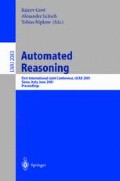Abstract
We define a subclass of the class of linear equational theories, called finitely closable linear theories. We consider unification problems with no repeated variables.We show the decidability of this subclass, and give an algorithm in PSPACE. If all function symbols are monadic, then the running time is in NP, and quadratic for unitary monadic finitely closable linear theories.
This work was supported by NSF grant number CCR-9712388.
Access this chapter
Tax calculation will be finalised at checkout
Purchases are for personal use only
Preview
Unable to display preview. Download preview PDF.
References
F. Baader and T. Nipkow. Term Rewriting and All That. Cambridge, 1998.
C. Kirchner. Computing unification algorithms. In Proceedings of the First Symposium on Logic in Computer Science, Boston, 200–216, 1990.
C. Kirchner and H. Kirchner. Rewriting, Solving, Proving. http://www.loria.fr/~ckirchne/ , 2000.
C. Kirchner and F. Klay. Syntactic Theories and Unification. In LICS 5, 270–277, 1990.
F. Klay. Undecidable Properties in Syntactic Theories. In RTA 4,ed. R. V. Book, LNCS vol. 488, 136–149, 1991.
C. Lynch and B. Morawska. Goal-directed E-unification. To appear in 12th International Conference on Rewriting Techniques and Applications.
C. Lynch and B. Morawska. Approximating E-unification. Submitted.
C. Lynch and B. Morawska. http://www.clarkson.edu/~clynch/papers/linearfull.ps/ , 2001.
R. Nieuwenhuis and A. Rubio. Paramodulation-based Theorem Proving. To appear in Handbook of Automated Reasoning, 2001.
Author information
Authors and Affiliations
Editor information
Editors and Affiliations
Rights and permissions
Copyright information
© 2001 springer-Verlag Berlin Heidelberg
About this paper
Cite this paper
Lynch, C., Morawska, B. (2001). Decidability and Complexity of Finitely Closable Linear Equational Theories. In: Goré, R., Leitsch, A., Nipkow, T. (eds) Automated Reasoning. IJCAR 2001. Lecture Notes in Computer Science, vol 2083. Springer, Berlin, Heidelberg. https://doi.org/10.1007/3-540-45744-5_43
Download citation
DOI: https://doi.org/10.1007/3-540-45744-5_43
Published:
Publisher Name: Springer, Berlin, Heidelberg
Print ISBN: 978-3-540-42254-9
Online ISBN: 978-3-540-45744-2
eBook Packages: Springer Book Archive

